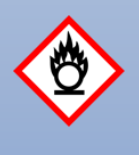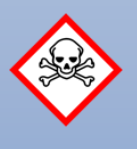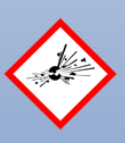A chemical classified as a health hazard, a gas the displaces oxygen, a gas that spontaneously ignites when exposed to air, a combustible dust or other hazard not classified.
what is a A hazardous chemical
The number of common hazard classes in the globally harmonized system?
What is 6 classes.
What is the users first line of defense for chemicals coming into the workplace?
Proper labeling of chemicals.
An SDS or Safety Data Sheet serves what primary function?
What is aid the end user in working safely with a chemical.
These 4 items are a part of what?
labeling requirements, storage of SDS, listings of all chemicals and employee training requirements.
What is a hazard communication plan.
Two categories of hazards in the work place
What are Physical Hazards or Health Hazards
This pictograph represents what common class of hazard. 
What is an oxidizer
Give 3 of 6 proper labeling elements?
What are:
product identifier,
pictograms,
signal words,
hazard statements,
precautionary statements, and/or
supplier contact information.
What is, Employers must ensure that all employees are trained and able to access electronic SDS.
Employees must be trained initially and __________?
When an employee is assigned to a job with new chemical hazards or when new chemical hazards are introduced into the workplace.
This entity is responsible for classifying hazardous chemicals.
Who is the manufacturer and or importer.

What is toxic or poison.
The language or languages all labels are required to be communicated in?
What is English
This is a critical time for having access and reviewing SDS?
What is during emergencies such as a release.
These are two forms of communication required to be provided by the employer?
What are proper labeling and warnings.
The person's required to read and understand chemical information and obey all associated safety precautions.
Who is the worker.

What are explosive chemicals.
The amount of time hazardous chemicals can remain unlabeled when being used in small quantities?
What is after a shift or when it leaves the individuals use.
When reading an SDS, end users should focus on what two areas?
What are the health hazards and the physical hazards. What the mitigation for those hazards are.
Who would you contact or where would you go to acquire more information about Hazard Communication?
Who is my supervisor, corporate safety or go to section 1200 of the OSHA standard and/or the AECC Hazcom standard.
A hazardous chemical whose only threat is that it is explosive would be considered this type of hazard?
What is physical.
These products are exempt from HazCom requirements?
What are household cleaning products used in small quantities.
These are the two most common labels used in the U.S.?
What are, Hazardous Materials Identification System (HMIS), or National Fire Protection Association(NFPA).
Are optional in the U.S. Primarily because other standards cover the material (i.e DOT)
These 3 items sometimes result in overexposing employees to hazardous chemicals?
What are accidents, equipment failure and/or lack of knowledge.